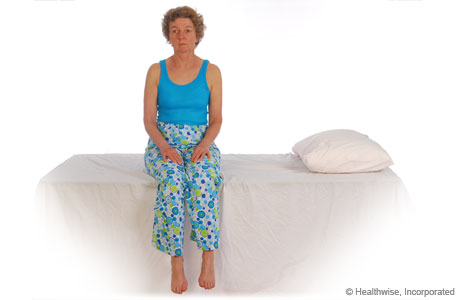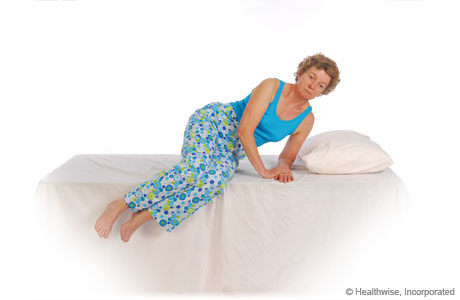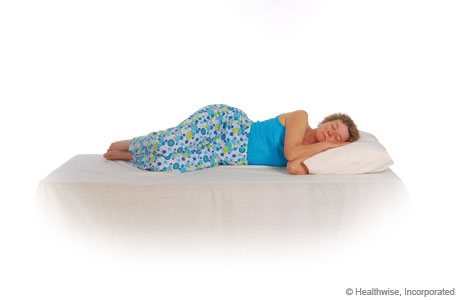Log Roll Method for Safe Movement
Overview
If you've had surgery on your back or belly, an injury to your trunk, or pain in your back, then you know that bending and twisting can cause more pain or injury. You can use the log roll method to get in and out of bed safely.
To get into bed, you first need to sit on the side of the bed. To sit down safely:
- Stand with the back of your legs touching the bed.
- Reach your hands back toward the bed as you bend your knees.
- Use your arms to help lower yourself to sit on the side of the bed.
Then follow these steps to lie down in bed without bending or twisting. Don't rush as you do the steps.
Sit up straight on the side of the bed.

Keep the center part of your body (your trunk) straight. Think about lowering your body without twisting.
Start to lie on your side.

Keep your trunk straight and use your arms to help lower your upper body to the bed. Your arms can support your upper body weight and keep you from twisting. As you lie down, let your legs rise, keeping them in a straight line with your trunk. The idea is to keep your trunk in one stable position as you lower your upper body and raise your legs onto the bed.
Keep your trunk straight after you lie down.

You may want to put a pillow between your knees to keep your back in a neutral position. If you roll onto your back, you may want to put a pillow under your knees for support.
To get out of bed, do the same steps in reverse:
- Lie on your side, facing the direction you want to get out of the bed.
- Use your arms to help raise your upper body as you lower your legs to the floor. Keep your trunk straight as you move.
- Sit up straight on the side of the bed.
- Use your hands to help push yourself up to a standing position.
Tips to make the log roll easier
Here are some tips that may help you use the log roll method for getting in and out of bed.
- After you sit on the side of the bed, use your arms to lower yourself onto your side.
The idea is to keep your trunk straight as you lower your upper body and raise your legs.
- Make your movements slow and steady.
If you get dizzy, pause for a few moments when you go from sitting to standing.
- Keep your trunk straight.
Imagine that your trunk is a plank of wood that can't bend or twist.
- Have an extra pillow within reach.
Use the pillow for support if you need it.
- Position yourself differently in bed to avoid painful movement.
For instance, you can:
- Get in and out of bed from the opposite side.
- Sleep with your head at the foot of your bed.
- Follow the instructions from your doctor or physical therapist.
You may get different instructions based on your needs.
Credits
Current as of: July 31, 2024
Author: Ignite Healthwise, LLC Staff
Clinical Review Board
All Ignite Healthwise, LLC education is reviewed by a team that includes physicians, nurses, advanced practitioners, registered dieticians, and other healthcare professionals.
Current as of: July 31, 2024
Author: Ignite Healthwise, LLC Staff
Clinical Review Board
All Ignite Healthwise, LLC education is reviewed by a team that includes physicians, nurses, advanced practitioners, registered dieticians, and other healthcare professionals.

